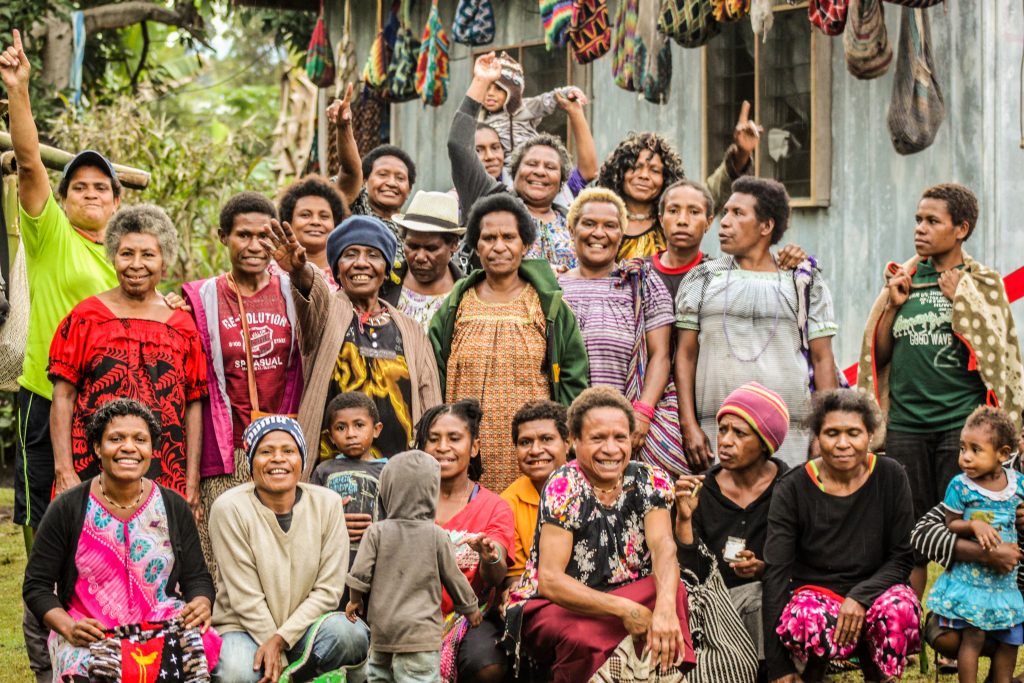by Annie Smits, TDi CEO
This is my love letter to PNG, to bilum, and to the weavers, and it’s part of our ongoing recognition of the importance of the creative and cultural industries as a whole. You can find our short film, The Bilum Story, at the bottom of this page.
The Bilum Story is one that is ancient. It’s a story that has travelled through generations.
Not only is this a generational story, it’s also a story of contemporary collaboration – a story of the twelve years of teamwork that has helped bring bilum to the world.

Bilum is now in high demand as an artisan product in boutiques around the world.
This is the story of bilum, and it’s the story of the women of Papua New Guinea.
For me, and for the TDi team, it has been such a privilege to be part of this collaboration, working across the bilum supply chain to help secure market access for the weavers, and to shore up economic security for the women at the centre of this industry. At TDi we believe deeply in the power of story-telling and in its ability to transform us. Daily, we work alongside entrepreneurs to help them design business models and build strategy, and we do this through story.
Now, more than at any other point in history, we need to listen to each other’s stories. Stories connect us to our roots, and remind us about what’s important and wonderful in life. Stories help us navigate misunderstanding and conflict. Stories help us to remember, to grieve, and to celebrate.
Some cultures paint, others are orators, some tell their stories through sculpture, or poetry. Papua New Guinean women tell their stories through bilum. Every bilum tells a story. We believe that the wider story – of bilum as a thriving creative industry – needs to be told, too.

And so, at TDi, we had the immense privilege of telling this story through a documentary. In this short film, we were committed to communicating two very clear messages:
Firstly, the power that the creative and cultural industries have to drive inclusive economic growth.
Bilum is one of the only supply chains in PNG entirely owned and run by women. Globally, the creative and cultural industry is worth at least 2.2 billion dollars. We know it’s likely to be greater than that, because so many of these supply chains exist in informal markets. Creative and cultural industries offer so much opportunity for small business creation, and they’re also a vehicle for traditional knowledge and wisdom to be preserved and passed on.
Creative industries employ more youth and women than any other sector, worldwide – what an opportunity! Bilum in PNG is often viewed as a ‘cottage industry’, but this cottage industry pays for the education of children, puts food on tables, and builds homes – in short, it ensures economic security and creates real foundations and opportunity for the next generation.
Secondly, we were committed to telling a story of courage & strength.
It’s popular in aid & development circles to tell stories of deficiency, of ‘poor women in the village’. This is not our experience of the women of Papua New Guinea. These women are fierce, and they are a force to be reckoned with! We wanted to tell the story of bilum from a place of abundance, strength, courage, resilience, and artistry. We believe we have achieved this. When the film was finished we sent it to one of our partners for input. Her response was, ‘You’ve told my story and the story of every Papua New Guinean woman, thank you!’

Bilum is a thriving creative industry in PNG, ensuring economic inclusion and security for the women weavers and their families.
I’d like to end by sharing one of my favourite quotes from Rebecca Solnit:
“Stories save your life. And stories are your life. We are our stories, stories that can be both prisons, and the crowbar to break open the door of that prison; we make stories to save ourselves or to trap ourselves or others; stories that lift us up or smash us against the stone wall of our own limits and fears. Liberation is always in part a storytelling process: breaking stories, breaking silences, making new stories. A free person tells her own story. A valued person lives in a society in which her story has a place.”
— Rebecca Solnit, “ A Short History of Silence,” from The Mother of All Questions
If you or your organisation, or your event or festival, would like to host a screening to help spread this uplifting work, please contact us. You’ll find out more about The Bilum Story here, including information about upcoming screenings.
The Bilum Story from The Difference Incubator on Vimeo.